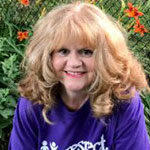New Year and New Beginnings: A Message From Dr. Patricia Newman
 Happy New Year!
Happy New Year!
The beginning of the year seems to be the time many people use to assess some aspect of their lives or behavior and decide if there is a better or more fulfilling way to reach their goals.
Those of us at the RESPECT organization easily identify with the concept of assessment and trying to make things better – because evaluation and having conversations with each other and with professionals outside our organizations are continuous processes for us!
The process of gathering meaningful data to determine if our programs are useful, efficient, and effective has been characteristic of RESPECT since we began. I attribute this to my training in special education and psychology – fields in which evidence is important in determining if plans to help children are being effective or should be changed. Making every minute count is important.
RESPECT wants every minute of our programs to be fun, relevant, motivating, life changing – even lifesaving. We often hear positive things about our programs, our audiences applaud, and schools invite us back year after year. But that is not enough. We need as much concrete data and evidence as possible.
RESPECT has several ways to assess our work and we reach out to many different sources to get their feedback.
We have pre and post program evaluations for students to complete for all our plays with evaluation forms for all our programs. We ask students about what they experience related to the topics we present; information related to our own program objectives; and how their perceptions about learning with theatre. We ask about what they will use from our programs and how we can be better! We want to know what they learned from participating in the program and be able to compare the responses they give us AFTER the program, to the ones they gave us BEFORE the program.
We have evaluation forms for the adults who are participating in the programs as well. We want their feedback about our scheduling process as well as about the program and related materials.
Further feedback is provided by sharing our programs “live” with our Community Advisory Committee and students from various clubs, programs, and a Student Advisory Committee. We interview students whenever possible to learn what they have learned from us and what more they would like to see us do to make our work better!
RESPECT programs are excellent – but it is important for us to be continually aware of the changes that our audiences face and be responsive to those challenges. Gathering data from a variety of sources helps us be aware of how our programs need to adapt to best meet the needs of the students we serve as well as how to make our work even better – more clear, accessible, timely – all of which makes it more effective in capturing the attention of our audience members and more helpful to the teachers and counselors who select RESPECT programs to help them with their overall social and emotional learning goals.
As with any assessment for any objective or goal? It is a process. It can involve a lot of conversations and collaboration. It can take time. But the end process is extremely satisfying in that we feel confident that our programs are a good investment of student and staff time as well as donor resources.
We want every minute with audiences to count!
